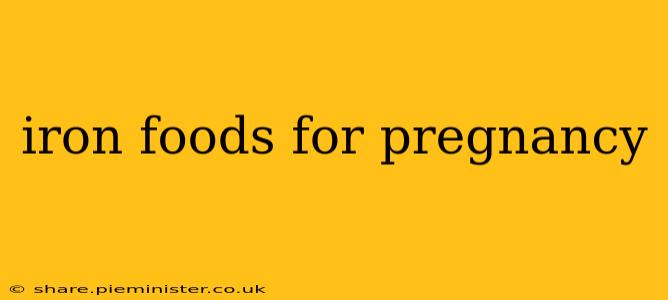Pregnancy places significant demands on a woman's body, requiring increased levels of various nutrients, including iron. Iron is crucial for producing hemoglobin, the protein in red blood cells responsible for carrying oxygen to the mother and developing baby. Iron deficiency anemia during pregnancy can lead to complications, highlighting the importance of incorporating iron-rich foods into your diet. This comprehensive guide explores the best iron sources for pregnant women, addressing common questions and concerns.
What are the best iron-rich foods for pregnant women?
Many foods naturally contain iron, categorized as heme iron (from animal sources) and non-heme iron (from plant sources). Heme iron is more readily absorbed by the body than non-heme iron. Here's a breakdown of excellent choices:
Heme Iron Sources (Best Absorbed):
- Red Meat: Lean cuts of beef, lamb, and venison are excellent sources of heme iron. Opt for lean options to minimize saturated fat intake.
- Poultry: Chicken and turkey, especially dark meat, provide a good amount of heme iron.
- Fish and Seafood: Salmon, tuna, and shellfish are good choices, also offering other essential nutrients like omega-3 fatty acids.
Non-Heme Iron Sources (Absorption Enhanced with Vitamin C):
- Legumes: Lentils, beans (kidney, black, pinto), and chickpeas are packed with iron and fiber.
- Dark Leafy Greens: Spinach, kale, collard greens, and Swiss chard are excellent sources of non-heme iron.
- Fortified Foods: Many breakfast cereals, breads, and pastas are fortified with iron. Check the nutrition labels to ensure adequate levels.
- Dried Fruits: Raisins, apricots, and prunes are surprisingly good sources of iron.
- Nuts and Seeds: Pumpkin seeds, sesame seeds, and almonds contain iron, although the amounts can vary.
How much iron do I need during pregnancy?
The recommended daily allowance (RDA) of iron increases during pregnancy. Your doctor will provide personalized recommendations based on your individual needs and health status. It's crucial to consult with your healthcare provider for accurate guidance on iron supplementation if necessary.
What foods enhance iron absorption?
Vitamin C significantly enhances the absorption of non-heme iron. Pairing iron-rich plant foods with foods high in vitamin C, such as citrus fruits (oranges, grapefruits), strawberries, bell peppers, and tomatoes, can maximize the benefits.
Can I get enough iron from diet alone during pregnancy?
For many women, a balanced diet rich in iron-rich foods can provide sufficient iron. However, some women may require iron supplements to meet their increased needs. Your doctor will assess your iron levels through blood tests and recommend supplementation if necessary.
What are the symptoms of iron deficiency anemia during pregnancy?
Iron deficiency anemia symptoms can include fatigue, weakness, pale skin, shortness of breath, headaches, and dizziness. If you experience any of these symptoms, consult your doctor immediately.
Are there any foods to avoid when trying to increase iron intake?
While there aren't foods to strictly avoid, limiting foods that inhibit iron absorption, such as those high in tannins (tea, coffee) and phytates (whole grains, legumes), is advisable, especially in the time surrounding meals containing iron. The overall health benefits of these foods generally outweigh the minimal impact on iron absorption.
What if I'm a vegetarian or vegan during pregnancy?
Vegetarian and vegan diets can provide adequate iron, but careful planning is essential. Combining various iron-rich plant foods with vitamin C-rich foods is crucial to maximize iron absorption. Your doctor might recommend an iron supplement to ensure you're meeting your daily requirements.
How can I make sure I'm getting enough iron during pregnancy?
- Maintain a balanced diet: Include a variety of iron-rich foods from both plant and animal sources.
- Pair iron-rich foods with vitamin C: Enhance iron absorption by consuming vitamin C-rich foods with your iron-rich meals.
- Consult your doctor: Regular check-ups and blood tests will help monitor your iron levels and identify any deficiencies early on.
- Consider iron supplements: If your doctor recommends it, take iron supplements as directed.
By following these guidelines and working closely with your healthcare provider, you can ensure you're getting enough iron to support a healthy pregnancy for both you and your baby. Remember, a healthy diet is only one aspect of prenatal care. Regular exercise, adequate rest, and stress management are equally crucial for a successful pregnancy.
